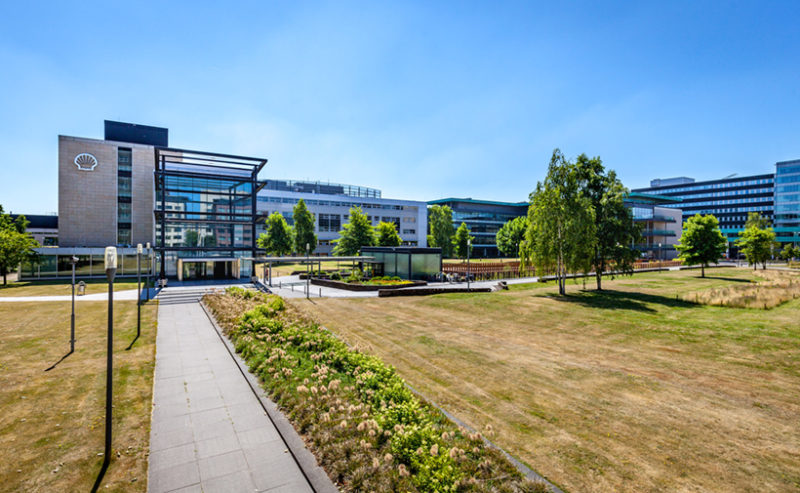
Rijswijk Centre for Sustainable Geo-energy opened
Thursday 5 March 2020 marked the opening of the Rijswijk Centre for Sustainable Geo-energy (RCSG): a unique field lab that enables full-scale testing of geothermal energy projects. Geothermal energy could play a vital role in the energy transition and could realistically supply a quarter of the Netherlands’ heating needs by 2050. In order to accelerate this process, the RCSG was set up by the Ministry of Economic Affairs and Climate, the nationalised energy management firm EBN, the Province of Zuid-Holland, the Municipality of Rijswijk and TNO.
The RCSG is housed in Shell’s former Drilled Well Research and Testing Centre in Rijswijk. Businesses active in the geothermal energy sector can make use of this advanced laboratory. It is equipped with all necessary facilities to test and experiment with new drilling techniques and materials under high-pressure and high-temperature conditions. Nearly all underground conditions in the Netherlands can be imitated and there are only a handful of similar testing centres in the world.
Importance of geothermal energy
Geothermal energy can play a vital role in the energy transition as it is one of the most important sources of sustainable energy. In the Netherlands, we already generate 3.5 petajoules of geothermal energy per year but this total must be increased in the future. We expect geothermal energy to satisfy around a quarter of our country’s heating needs (200 PJ) by 2050. A great deal of work needs to be done with regard to drilling, as it needs to become more cost effective with continual focus on the issue of safety. In short, a great deal of technical innovation is required. The RCSG offers the facilities required to develop and test these innovative new designs under the high-pressure and high-temperature conditions found below the surface of the earth.
Accessible for businesses
The centre is accessible to all businesses wanting to test or experiment with new drilling techniques and materials for the generation of geothermal energy or for other sustainable applications. It gives them access to state-of-the-art facilities that they would otherwise find it difficult or impossible to access and saves them from having to invest in testing facilities themselves. As such facilities are usually very expensive, potentially crucial inventions could remain undiscovered.
Recreation of underground conditions
The centre possesses 20 installations that cover the entire spectrum of underground drilling conditions. A large drilling rig has been installed over a nearly 400-metre-deep well in which new materials and techniques can be tested. There are 300 and 400-tonne hydraulic presses, pressure tanks capable of accommodating up to 1,000 bar and piping systems for experiments in pumping fluids. All kinds of underground conditions can be recreated to discover how certain materials and components perform in high-pressure or high-temperature scenarios.
Our partners discussing the innovation lab
Ton de Jong, Director of Energy Transition at TNO talking about the RCSG:
“Sustainable use of the subsoil has been on TNO’s research agenda for years. Our research focuses on extracting both low and high-temperature geothermal heat, temporarily storing energy in the ground and capturing CO2 during the phase-out of the fossil-fuel energy system. The RCSG enables businesses and knowledge institutions to closely collaborate on the development of new technology and to take huge steps in the transition to a sustainable energy system.”
Jan Willem Hoogstraten, CEO of EBN:
“In the Netherlands, the future of sustainable energy above the ground largely depends on knowledge and appreciation of what goes on below the ground. The centre helps us to develop technology that can facilitate the social and economic development of the ground beneath our feet. EBN wants to accelerate the energy transition by developing knowledge, technology and innovation. The centre can play a vital role in developing and reinforcing growth markets such as geothermal energy and storage of CO2, hydrogen and heat.”
Sandor Gaastra, Director-General at the Ministry of Economic Affairs and Climate:
“Geothermal energy can make a vital contribution to green heating. The geothermal energy sector is relatively young and undergoing rapid development. The centre offers accessible facilities to experiment with new techniques and materials, which will substantially accelerate this development.”
Berend Potjer, Provincial Executive Member for Energy at the Province of Zuid-Holland:
“We are proud to have this cutting-edge centre in our province as boosts our status as a world leader in geothermal energy. We already possess a great deal of expertise in this field, which is no fluke given the suitability of Zuid-Holland’s subsoil for the extraction of geothermal energy. Furthermore, there is great demand for heating in our densely populated province, so supply and demand are perfectly matched. After so much pioneering work in recent years, it’s now time to scale up and start heating houses with geothermal energy as well as just greenhouses.”
Armand van de Laar, Alderman at the Municipality of Rijswijk:
“As well as helping to advance the energy transition, this project will also drive development in the area. The investment will create new business activity and dynamism in Plaspoelpolder. Rijswijk is happy to welcome all visitors and clients to the new testing centre as well as any other businesses who want to help realise a more sustainable world and are looking for office, manufacturing or laboratory space. Here, innovation and a fertile business climate go hand in hand.”